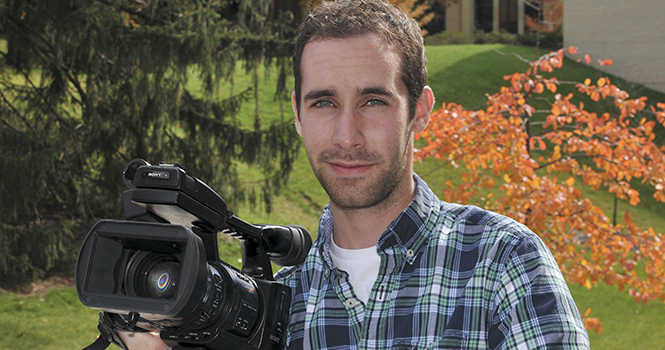Locals use Kickstarter to fund artistic projects
Dustin Lee, a graduate student at Kent State, utilized the donation-based website Kickstarter to help fund his short-film. Photo by Jessica Denton
October 29, 2012
As a Kent State student in 2007, Dustin Lee envisioned creating a short sci-fi love story called “20th Century Man.” It wasn’t until 2011, after making more connections and gaining a full-time job, that Lee shot the short film.
This year, “20th Century Man” was accepted to 11 film festivals around the country. While Lee, video production supervisor for University Communications and Marketing, paid $500 to shoot the film out of pocket, the music and fees to submit to film festivals were paid for by Kickstarter donations.
Kickstarter is a website that serves as a platform for creative projects to raise money. Anyone with a creative vision can start a project, and anyone with the means can back, or donate to, that project. Popular bands like The Dresden Dolls, who raised $1.2 million for an album, have used the site.
Lee’s goal was to raise $2,500. In the end, the project raised $3,200. Promoting the project, Lee said, was the most important step to garner support.
“You can’t just put it up on the website and expect people to find it,” he said. “You’ve got to send it out to your contacts, especially people who worked on the film. If they have friends or family members that are interested in helping, you know, you could do it like that. Or you could put it on Facebook. … Just get it out there.”
Lee was fortunate that his project got featured on the site.
Tips for a successful Kickstarter project:
- Show prior work so people know what they’re paying for.
- Have a good pitch and be enthusiastic.
- Give good rewards to your backers. “I’m not giving you 50 bucks, 100 bucks, just to get, like, a little pin to put on my shirt,” Lee said.
- Set a realistic goal. Funding on Kickstarter is all-or-nothing: If donations don’t meet the goal you set on the site, you do not receive the funds.
“So, boom, as soon as you log into Kickstarter, our screen shot from our film is right there on the homepage and we got a ton of traffic from that,” Lee said.
Sophomore entrepreneurship major Sam Lasko has successfully funded two projects through the site.
“My first one was my first band, God and His Gun,” Lasko said. “We raised $2,500 for our album and other merch-related things. … And then my second project that got funded successfully was my other band, By George. … I think we got together just $500 for the mastering of our audio tracks. Overall, it was a crazy success.”
Lasko said his bands used social networking to raise awareness. For bigger donations, however, the group sent emails to possible donors. Lasko explained that sending out emails made their approach more personal, so they appeared even more serious about their work.
“The best thing you can do is just make yourself look as marketable and successful as possible to make people want to invest in you,” Lasko said.
David DiPillo, a software developer from Youngstown, has backed 97 Kickstarter projects. DiPillo said he felt honored to assist in the creation of another person’s art. He said the most important things he looks for in an artist’s pitch are enthusiasm and passion.
“I feel that I have a good sense of whether or not someone feels love toward their art by the detail that is shown in the finished product,” he said. “I mean, I guess it’s possible for Leonardo DaVinci to have hated painting, but by looking at the fine detail of the Mona Lisa, he certainly has me fooled.”
Lee said having something to show for your work — clips from your movie, a recording of your band, examples of your art — is what people want to see.
“If I’m a backer and this person is trying to get me to donate and they don’t really have anything to show me, outside of, like, a really good pitch — even if they pitch it well — you can still be kind of skeptical about it,” he said. “‘Cause you don’t know how well they’re going to do. Do I really want to give you $100 if I think your project’s going to turn out like crap?”
Backers pledging $25 or more to Lee’s project received a signed DVD of the film. Three donators who gave $500 were listed as executive producers on the film’s IMDB.com page.
After his project ended, Lee continued to update his backers on its success. Some of his backers even received passes to film festivals that Lee couldn’t attend.
Lasko said his band, God and His Gun, wrote a personalized song for a backer who gave $500 and it will debut on the band’s second album.
“I think it’s really cool that [Kickstarter] encompasses a lot of different projects, from people starting pizza shops to bands to videographers — anyone starting a project they believe in,” Lasko said. “So, in that way, I think it’s a really cool idea. Just people helping people.”
Contact Angel Mack at [email protected].













